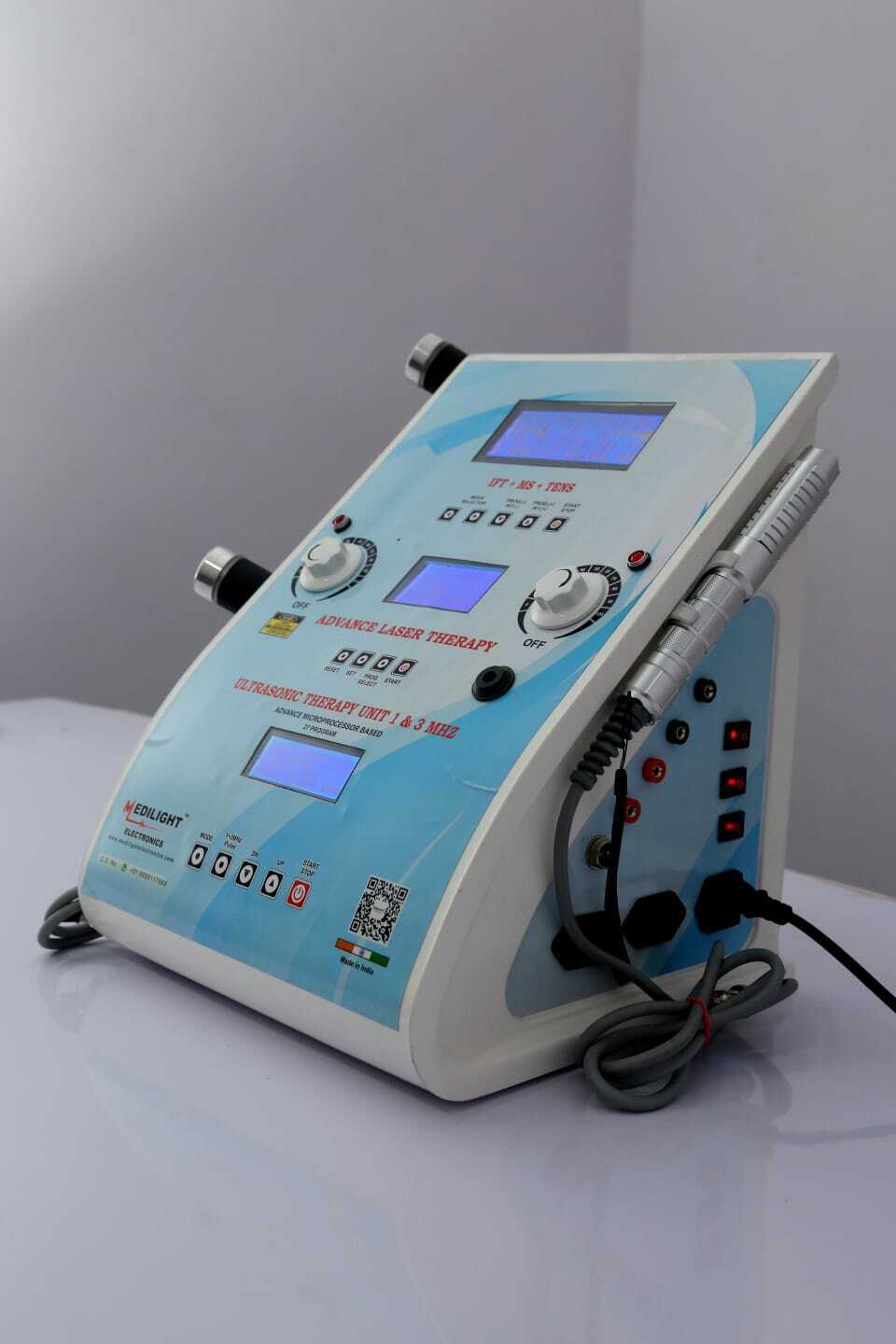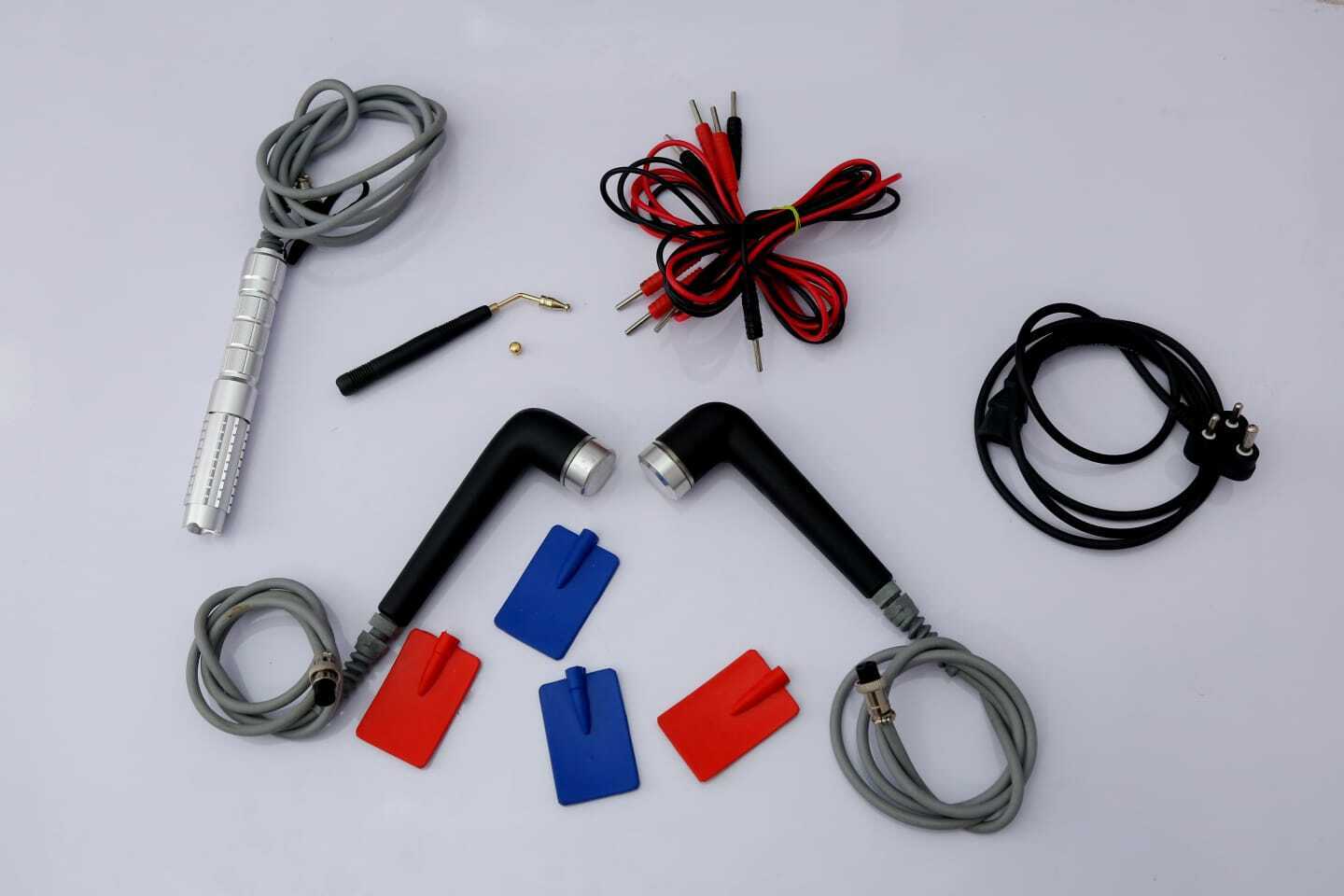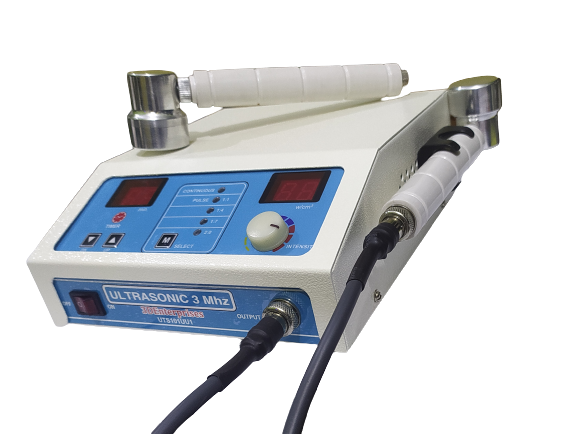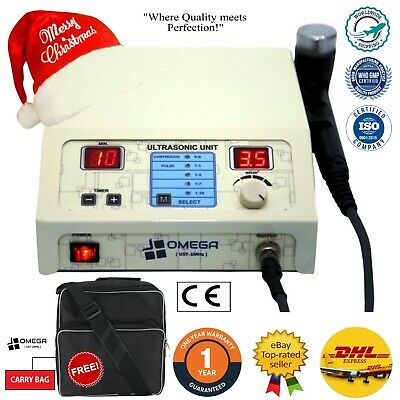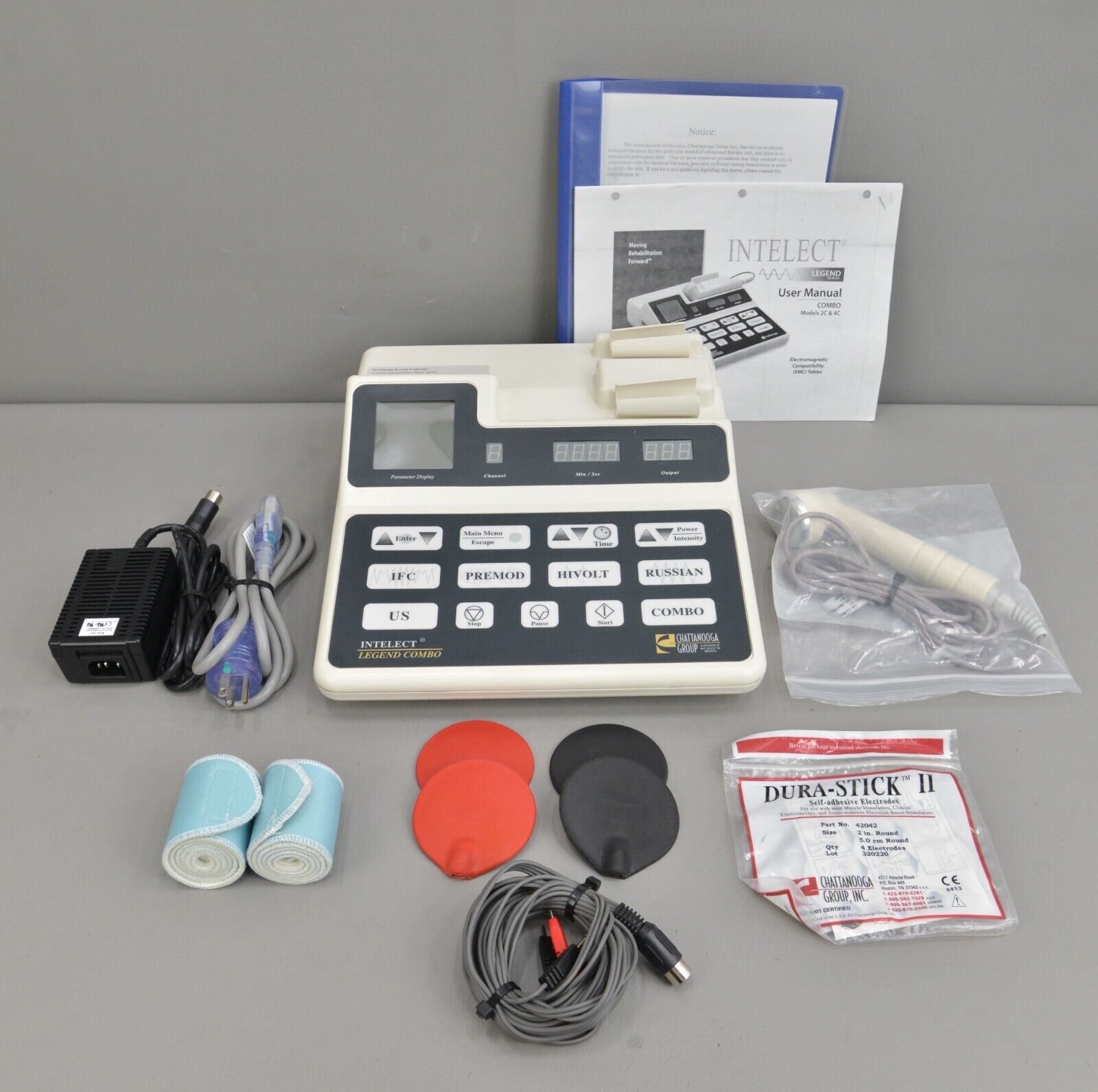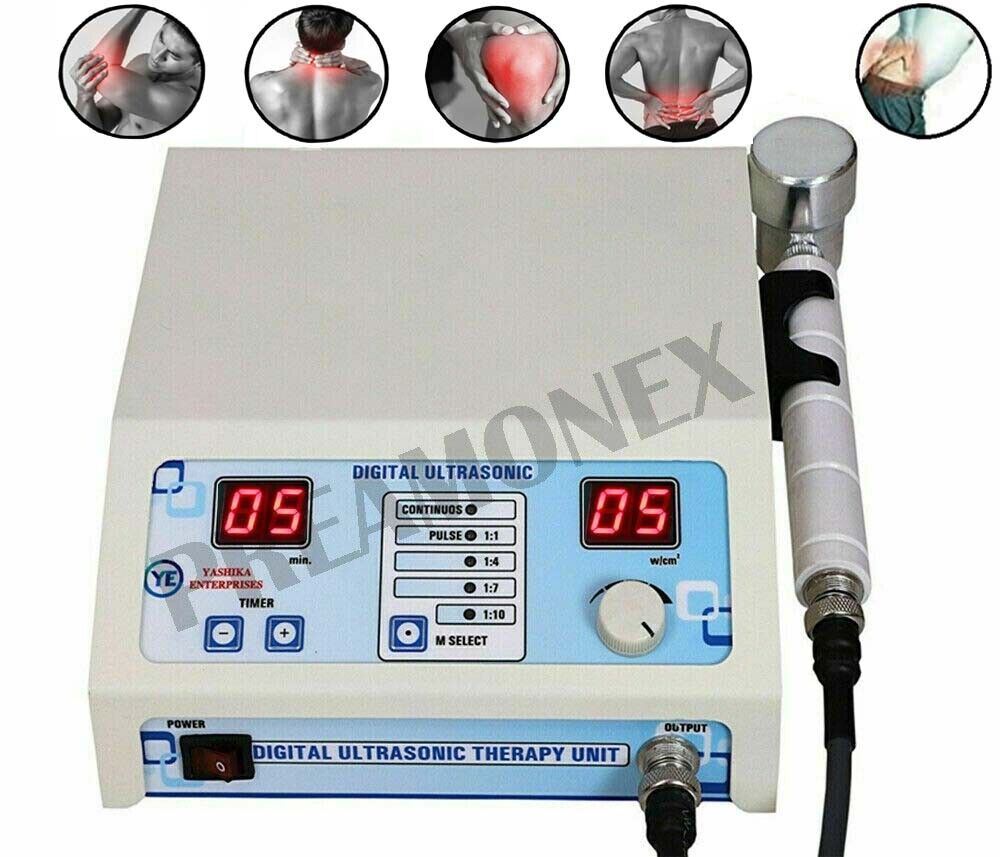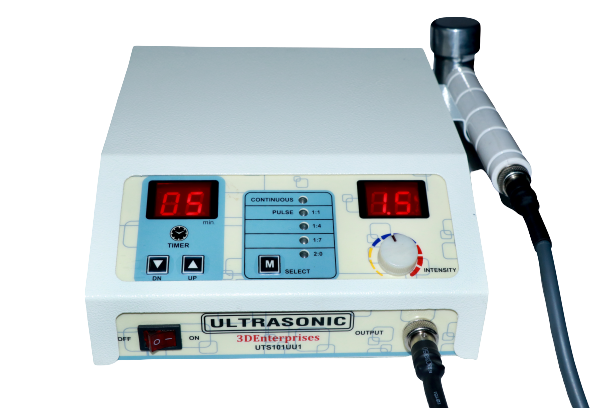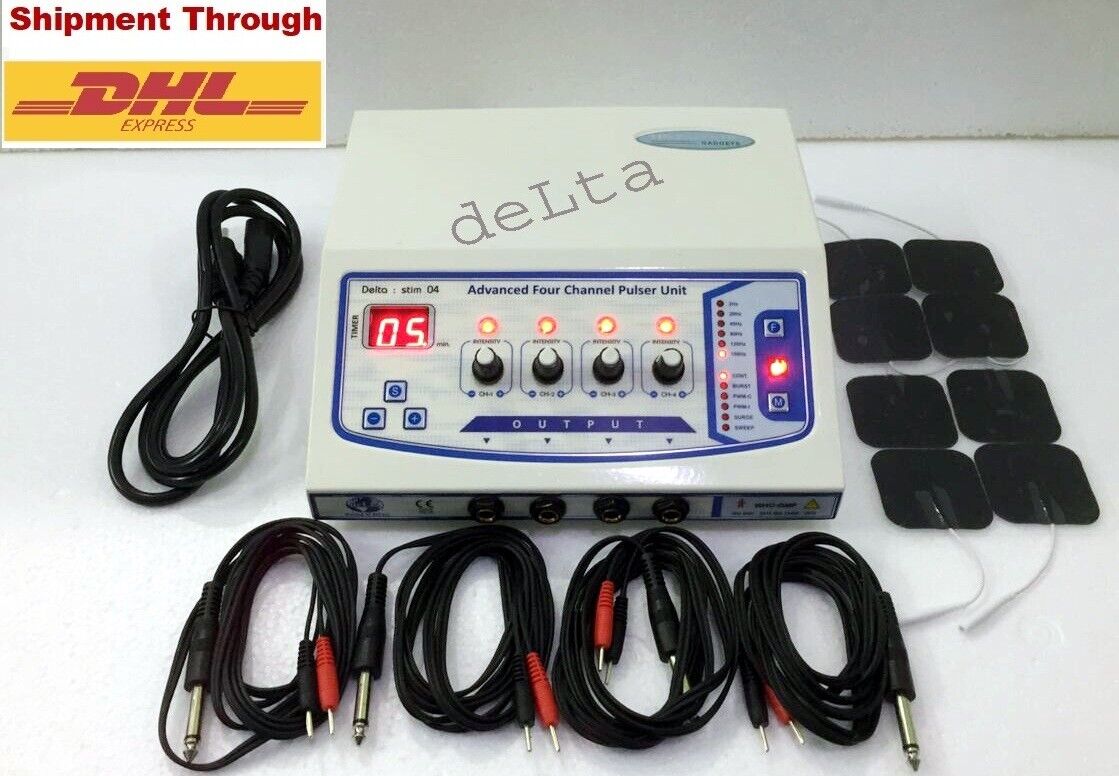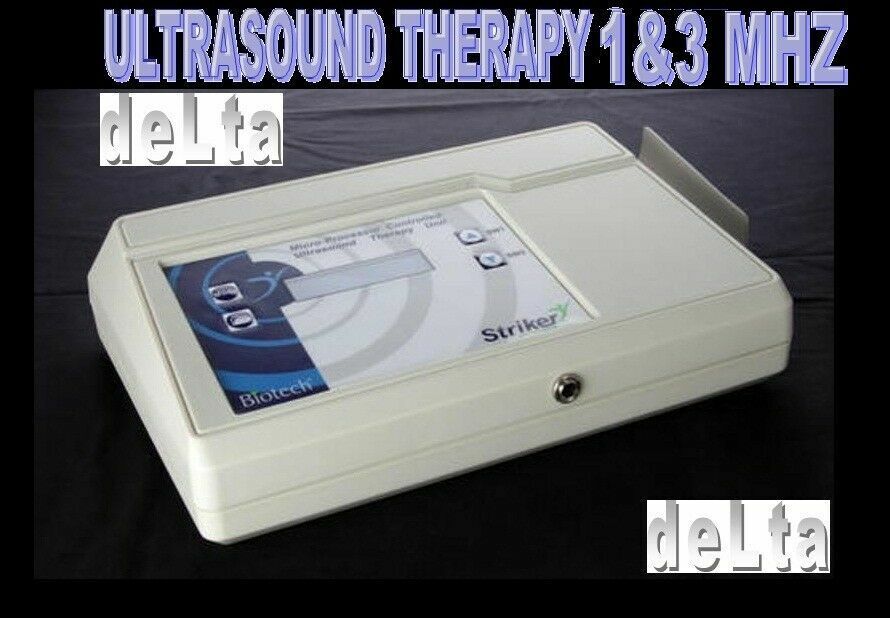-40%
MEDILIGHT - 6 IN 1 COMBINATIOIN - IFT+TENS+MS+ US1&3MZH+DEEP HEAT 4CH + LASER 3B
$ 316.27
- Description
- Size Guide
Description
6 IN 1 COMBINATION5 IN 1
COMBINATION THERAPY UNIT
(IFT+US+TENS+MS+DEEP HEAT)
COMPLETE PROGRAM FEATURES :
Prog
no.
Treatment name Treatment Time Beat freq. Scan pattern Treatment
mode
01. Adhesion pain IFT 10 Min 50-150 Hz scan Rectangle 4P
02. Ankle distortion IFT 12 Min 75-150 Hz scan Trapezodial 4P
03. Bonypathology IFT 10 Min 25-100 Hz scan Trapezodial 4P
04. Brachial pain IFT 15 Min 50-100 Hz scan Rectangle 4PV
05. Bronchial Asthama IFT 10 Min 50-150 Hz scan Rectangle 4PV
06. Bursitis Pain IFT 15 Min 0-150 Hz scan Triangle 4P
07. Capsulitis IFT 15 Min 75-150 Hz scan Triangle 4PV
08. Cervical Pain IFT 15 Min 75-150 Hz scan Rectangle 4PV
09. Cervicobrachial pain IFT 12 Min 25-100 Hz scan Triangle 4P
10. Contracture Pain Russian 15 Min 01-50 Hz scan Trapezodial 4PV
11. Crackling Peritndnts IFT 15 Min 50-150 Hz scan Triangle 4P
12. Croxd Ligaments IFT 12 Min 75-150 Hz scan Triangle 4PV
13. Distortion Foot IFT 15 Min 75-150 Hz scan Rectangle 4PV
14. Edema Pain IFT 15 Min 50-150 Hz scan Triangle 4P
15. Epicondylitis Pain IFT 15 Min 25-150 Hz scan Rectangle 4PV
16. Epitrocleytis Pain IFT 15 Min 75-150 Hz scan Triangle 4P
17. Gastric Atony IFT 10 Min 25-150 Hz scan Triangle 4P
18. Gastric Ptosis IFT 15 Min 0-150 Hz scan Triangle 4PV
19. Gonalgia Pain IFT 10 Min 50-150 Hz scan Rectangle 4PV
20. Gonoarthrosis IFT 12 Min 25-150 Hz scan Triangle 4P
21. Herpes Zoster IFT 10 Min 50-150 Hz scan Rectangle 4PV
22. Hyprtonc trpzis musc Russian 10 Min 25-100 Hz scan Trapezodial 4P
23. Idiopathic Scoliosis Russian 10 Min 0-50 Hz scan Rectangle 4P
24. Intercostal IFT 15 Min 0-150 Hz scan Triangle 4PV
25. Ischialgia IFT 17 Min 0-50 Hz scan Rectangle 4P
26. Leg Syndrom Pain IFT 15 Min 0-150 Hz scan Triangle 4P
27. Lumbago Pain IFT 12 Min 0-150 Hz scan Trapezodial 4P
28. Lumbago pain 2 IFT 20 Min 25-100 Hz scan Rectangle 4PV
29. Lower back pain IFT 17 Min 0-150 Hz scan Triangle 4PV
30. Lumbar disc hernia IFT 15 Min 0-150 Hz scan Trapezodial 4PV
31. Lumbar muscle pain IFT 15 Min 0-150 Hz scan Triangle 4PV
32. Lumbar spondylosis IFT 15 Min 50-150 Hz scan Rectangle 2P
33. Ligament strain IFT 12 Min 0-150 Hz scan Triangle 4P
34. Menisus Lesion IFT 10 Min 25-150 Hz scan Rectangle 4P
35. Metatarsus pain IFT 12 Min 0-50 Hz scan Triangle 4P
36. Motor Paralysis Low IFT 15 Min 25-100 Hz scan Trapezodial 4PV
37. Motor Paralysis upper IFT 15 Min 0-50 Hz scan Rectangle 4P
38. Muscle Strengthing IFT 20 Min 0-150 Hz scan Trapezodial 4P
39. Muscle Atrophy Russian 18 Min 0-50 Hz scan Rectangle 4PV
40. Muscular bruises IFT 10 Min 25-150 Hz scan Triangle 4P
41. Muscular Hernis IFT 15 Min 0-150 Hz cont. Rectangle 4PV
42. Muscular Hypotonus IFT 20 Min 0-50 Hz scan Rectangle 4P
43. Muscular Sprain IFT 10 Min 0-150 Hz scan Trapezodial 4P
44. Muscular Strains IFT 10 Min 25-150 Hz scan Triangle 2P
45. Myalgias Pain IFT 15 Min 0-150 Hz scan Trapezodial 4P
46. Myositis Pain IFT 10 Min 0-50 Hz scan Rectangle 4PV
47. Neuropathies Pain IFT 15 Min 50-150 Hz scan Triangle 4P
48. Numb Sores Pain IFT 12 Min 25-100 Hz scan Triangle 4PV
49. Osteorthrts Knee IFT 15 Min 50-100 Hz scan Triangle 4PV
50. Paraesthesia IFT 10 Min 0-150 Hz scan Triangle 4PV
51. Pelvic Pain IFT 15 Min 0-150 Hz scan Triangle 4P
52. Perathrts Shoulder pain IFT 07 Min 0-150 Hz scan Triangle 4PV
53. Peripheral Facial IFT 10 Min 0-50 Hz scan Triangle 4PV
54. Tennis Elbow IFT 17 Min 25-150 Hz scan Trapezodial 4P
55. Reptured fiber muscle IFT 15 Min 0-150 Hz scan Rectangle 2P
56. Reynaud Disease Russian 15 Min 75-150 Hz scan Rectangle 2P
57. Rheumarthritis Elbow IFT 10 Min 25-100 Hz scan Rectangle 4PV
58. Rheumarthritis knee IFT 12 Min 0-150 Hz scan Rectangle 4PV
59. Sciatica Pain IFT 08 Min 50-100 Hz scan Rectangle 4PV
60. Spondylo Arthritis IFT 20 min 0-150 Hz scan Trapezodial 4PV
61. Spiral Pain IFT 16 Min 25-150 Hz scan Triangle 4PV
62. Temporomandibular Pain IFT 20 Min 0-150 Hz scan Trapezodial 4P
63. Tendinitis Sheth Hyg IFT 10 Min 0-50 Hz scan Triangle 4P
64. Tendopathy IFT 15 Min 0-50 Hz scan Triangle 2P
65. Tendon Vaginitis IFT 18 Min 0-150 Hz scan Triangle 4P
66. Teno Vaginitis IFT 15 Min 0-150 Hz scan Triangle 4P
67. Trigeminal Neuralgia IFT 15 Min 0-50 Hz scan Trapezodial 2P
68. Trigeminus Neuralgia IFT 10 Min 25-150 Hz scan Rectangle 4P
69. Ulnar Styloiditis IFT 15 Min 75-150 Hz scan Rectangle 4PV
70. Valgus Bigtoe Pain IFT 10 Min 0-150 Hz scan Trapezodial 4P
TENS PROGRAMS
Prog no. Treatment name Treatment
time
Mode Frequency
71. Angina Pectoris 12 Min Ultra Reiz Long 100 Hz
72. Ankle Sprain 10 Min Burst deep 100 Hz
73. Arthritis 10 Min Combination 150 Hz
74. Cervical Pain 12 Min Ultra Reiz 75 Hz
75. Dental Procedure 10 Min Continuous 50 Hz
76. Diabeties Pain 20 Min Sweep Mode 0-150 Hz variable
77. Dysmenor Rhial 10 Min Ultra Reiz long 100 Hz
78. Facial Pain 10 Min Combination 75 Hz
79. Foot drop 15 Min Burst mode 80 Hz
80. Knee Pain 15 Min Burst medium 100 Hz
81. Labour Zoster 15 Min Sweep mode 0-150 Hz variable
82. Low back Pain 10 Min Ultra Reiz Long 100 Hz
83. Mata static bone pain 15 Min Continuous 100 Hz
84. Morning Sickness 15 Min Burst mode 100 Hz
85. Neuralgia 15 Min Burst mode 50 Hz
86. Perpherl Nerve Injury 15 Min Sweep Mode 0-150 Hz variable
87. Plantar Fasciitis 15 Min Burst deep 25 Hz
88. Post operative pain 10 Min Burst deep 150 Hz
89. Radiating Pain 15 min Continuous 2 Hz
90. Raynaud’s disease 12 Min Burst Medium 10 Hz
91. Rheumatic Stiff Neck 15 min Ultra Reiz 25 Hz
92. Rheumatoid Arthrities 12 Min Ultra Reiz Long 40 Hz
93. Rotula Chondropathy 20 Min Combination 30 Hz
94. Scapular Pain 15 Min Sweep Mode 0-150 Hz variable
95. Sciatica 15 Min Contimuous 10 Hz
96. Spondlytis Pain 15 Min Combination 20 Hz
97. Sudeck Syndrome 18 Min Continuous 10 Hz
98. Tendinitis Pain 15 Min Burst Deep 25 Hz
99. Tendon Pain 15 Min Sweep Mode 0-150 Hz variable
100. Wrist drop 10 Min Burst Medium 50 Hz
MS PROGRAMS
Prog No. Treatment name Treatment
time
Mode Frequency
101. Arteriosclerosic 20 Min I.G. 2 Hz
102. Arthriosis Pain 20 Min I.G. 10 Hz
103. Capsulitis Pain 12 Min Surge Faradic 25 Hz
104. Cardio Vascular Disorder 10 Min I.G. 10 Hz
105. Coxo-Arthrosis 12 Min Surge Faradic 50 Hz
106. Facial Palsy 20 Min Surge Faradic 75 Hz
107. Functional Paralysis 15 Min Surge Faradic 100 Hz
108. Hysterical 15 Min Surge Faradic 75 Hz
109. Iontophoresis 15 Min Surge Faradic long 100 Hz
110. Low skin Resistance 10 Min I.G. 2 Hz
111. Muscle Stimulation 10 Min Surge Faradic 75 Hz
112. Muscle Strain 15 Min Surge Faradic Long 100 Hz
113. Muscle Weakness 10 Min Surge Faradic 75 Hz
114. Neuropraxiz 12 Min Surge Faradic Long 150 Hz
115. Post Surgical stimulation 10 Min Surge Faradic 100 Hz
116. Re Education Muscle 12 Min Surge Faradic Long 100 Hz
117. Relaxation Muscle 12 Min I.G. 10 Hz
118. Resulting Neurosis 15 Min I.G. 2 Hz
119. Spastic Paralysis 12 Min Surge Faradic Long 75 Hz
120. Traumatic Neurosis 15 Min Surge Faradic 100 Hz
121. Vertigo Pain 12 Min Surge faradic Long 125 Hz
122. Soft Tissue Injury 08 Min I.G. 10 Hz
123. Dermatological Condition 10 Min Surge Faradic 150 Hz
124. Degenerative Joint 15 Min I.G. 2 Hz
125. Chronic Sinusitis 10 Min Surge faradic Long 125 Hz
INTERFERENTIAL THERAPY UNIT:
Interferential electrical stimulation is a unique way of effectively delivering therapeutic frequencies
to tissue. Conventional TENS and Neuromuscular stimulators use discrete electrical pulses delivered
at low frequencies of 2-160 Hz per second. However, Interferential stimulators use a fixed carrier
frequency of 4,000 Hz per second and a second adjustable frequency of 4,001-4,400 Hz per
second. When the fixed and adjustable frequencies combine (heterodyne), they produce the desired
signal frequency (Interference frequency). Interferential stimulation is concentrated at the point of
intersection between the electrodes. This concentration occurs deep in the tissues as well as at the
surface of the skin. Conventional TENS and Neuromuscular stimulators deliver most of the
stimulation directly under the electrodes. Thus, with Interferential Stimulators, current perfuses to
greater depths and over a larger volume of tissue than other forms of electrical therapy. When
current is applied to the skin; capacitive skin resistance decreases as pulse frequency increases. For
example, at a frequency of 4,000 Hz (Interferential unit) capacitive skin resistance is eighty (80)
times lower than with a frequency of 50 Hz (in the TENS range). Thus, Interferential current crosses
the skin with greater ease and with less stimulation of cutaneous nociceptors allowing greater
patient comfort during electrical stimulation. In addition, because medium frequency (Interferential)
current is tolerated better by the skin, the dosage can be increased, thus improving the ability of
the Interferential current to permeate tissues and allowing easier access to deep structures. This
explains why Interferential current may be most suitable for treating patients with deep pain, for
promoting osteogenesis in delayed and nonunion fractures and in pseudarthrosis, for stimulating
deep skeletal muscle to augment the muscle pump mechanism in venous insufficiency, and for
depressing the activity of certain cervical and lumbosacral sympathetic ganglia in patients with
increased arterial constrictor tone.
APPLICATIONS:
Product Specification
Frequency 50 Hz
Voltage 220V
MUSCLE STIMULATOR:
Electric stimulation works by attaching stick-on pieces of equipment to the skin and using
the control unit to transmit currents to targeted muscle groups. The control unit is where
the timer, sensory knobs and other devices are located to produce the electric current. Two
lead wires and two to four neurostimulation electrodes are the tools that are attached to the
skin to transmit the current. The machine may cause a number of unique sensations when
turned on and applied to a specific muscle group.
APPLICATIONS:
• Electric muscle stimulation (EMS) can help treat musculoskeletal injuries or
ailments.
• EMS is a common and effective way to:
o Relieve discomfort and pain
o Reduce muscle spasms
o Restore muscle tone
o Rehabilitate parts of the body
TECHNICAL SPECIFICATION:
Input Voltage : 220 V AC 50 Hz
Galvanic : Maximum output 100 Volt.
Interrupted galvanic : A switch to select 4 different mode of Frequency.
Faradic : Comprise 40 pulse of 0.9 Ms each pulse of 0.9 ms.
Surge Faradic : Step less control to increases.
T.E.N.S
Product Description
Tens Machine offered by us is broadly used in health centers, hospitals, and clinics and is
valued for their pain-relieving functionality. These machines provide small electrical pulses to
the body through electrodes positioned on the skin. The entirely automatic system along with
the digital display, these machines are very simple to operate and maintain.
Features
• 4 channel outputs
• Microcontroller based circuity
• Manual cum preprogram facility
• Obesity programs
• Built in re-chargeable battery with 5 hrs back - up
• ABS cabinet portable & light weight
Products Details
• Output mode - continuous/pulsed
• Frequency sweep - available
• Pre-program - 30 fitness program
• Display – 20*4 graphic LCD display
ULTRASONIC:
Microprocessor controlled digital unit, Just To provide the most effective Continuous and Pulsed treatments
in pain relief and muscle rehabilitation. It delivers 1 MHz through a unique ultrasound applicator. The effect
of ultrasound via an increase in local blood flow can be used to help reduce local swelling, chronic
inflammation and promote bone fracture healing.
Seven segment LED display for better visibility in low light settings, Improved button for easier navigation
With Ergonomically designed sound head.
Tech specifications:
Output One
Waveform Ultrasound
Modes Pulsed & Continuous
Frequency 1 MHZ
Duty Cycle (Continuous/ PL-PULSE)
PL - 1:1
PL - 1:2
PL - 1:4
PL - 1:6
PL - 1:8
PL - 2:0
Max. Intensity 3.5W (CONTINUOUS)
Treatment Time 0 – 99 Minutes
Power 110 – 220 V AC
Product Specification:
Power 110-220 V AC
Product Description
Just To provide the most effective Continuous and Pulsed treatments in pain relief and muscle rehabilitation.
It delivers 1 MHz through a unique ultrasound applicator. The effect of ultrasound via an increase in local
blood flow can be used to help reduce local swelling, chronic inflammation and promote bone fracture
healing.
Applications:
Relaxation of Muscle pain.
Prevention or redardation of disuse atrophy.
Increase local blood circulation.
Immediate post-surgical stimulation of calf muscles to prevent various thrombosis.
Maintaining or increasing range of motion.
LASER
Laser beam class: 3b
Program : 80 pre- protocol
Frequency: 1Hz to 3500 Hz 5500 Hz
Energy : min. 120 max. 9000mj
Max power 500 mw
Wave length : 650 nm 905nm
Timer : 1 to 10 min. adjustable
Supply voltage : AC 220/50 Hz
PRODUCT DESCRIPTION
:
The patient benefits and results of laser therapy have been significant. The greatest benefit of LLLT to the patient is that they experience immediate relief. Patients that undergo laser therapy are likely to heal 50%-60% faster and with recovery in their range of motion, strength and overall better functional movement. Although you’ll feel the laser device touching your skin, the procedure is painless and non-invasive. You will feel no vibration or heat. Each treatment takes only a few minutes.
ADVANTAGES OF LASER THERAPY
The laser has therapeutic effects which help to:
· Reduce pain
· Increases ATP (Adenosine Triphosphate) which accelerates the repair process of the cell. Some molecules that increase inflammation are reduced and beneficial antioxidants are increased.
· Faster wound healing. Laser Therapy is effective on open wounds also.
· Recovery from nerve injury Reduces aches and pains by decreasing nerve sensitivity.
· It reduces the formation of Fibrous/Scar tissue. It also improves the vascular activity in the body.
· Promotes bone and cartilage formation
CONDITIONS TREATED BY LASER THERAPY
With broad-ranging benefits, LASER Therapy is appropriate for a lot of treatment plans. Some of them are:
· General Chronic Pain
·
Tennis elbow
·
Plantar fasciitis
· Shoulder impingement
·
Frozen shoulder
·
Disc herniation
·
Sciatica
· Pelvic Dysfunction
·
Osteoarthritis
of the knee, hip, and ankle
·
Rheumatoid arthritis
·
Tendonitis
·
Tennis Elbow
·
Temporomandibular Joint
·
Diabetic Neuropathy
· Hip or shouder bursitis
